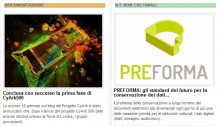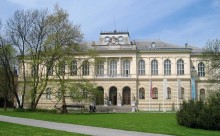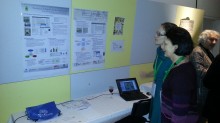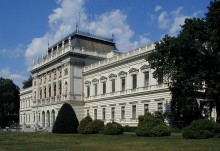-
Join the
Digital Meets Culture
Open Newsroom! If you have interesting news and events to point out in the field of digital cultural heritage, we are waiting for your contribution.
If you have interesting news and events to point out in the field of digital cultural heritage, we are waiting for your contribution.
-
Free text
-
-
Upcoming events
-

Step into the world of history and heritage through stunning 3D collections that bring the past to life. From pre-cinema artifacts in Girona to everyday objects and cultural emblems from the ancient oppidum of Bibracte in Burgundy, these collections … Continue reading →
 The deadline for submitting photographic projects for the AIPAI PHOTO CONTEST has been extended
The deadline for submitting photographic projects for the AIPAI PHOTO CONTEST has been extendedThe deadline for submitting photographic projects for the 3rd edition of the AIPAI PHOTO CONTEST, the photography contest organized by the Italian Association for Industrial Archaeological Heritage ETS, has been extended to October 31. The contest is organized in collaboration with DICEA … Continue reading →
 Brussels, November 13th and 14th, 2024
Brussels, November 13th and 14th, 2024On November 13th and 14th, OpenLab.brussels is hosting the international conference “Creating Knowledge through Participatory Research” in Brussels. The OpenLab.brussels is a joint venture of ULB-VUB dedicated to participatory research. It aims to mobilize our academic community and public or private stakeholders … Continue reading →
Area: digital heritage

In Pisa, at Palazzo Lanfranchi, from 11th April to 2nd June 2014, a great photographic and multimedia exhibition based on the most advanced digitization and printing technologies, telling the stories of our grandfathers. The exhibition is organized in the framework of the EU-funded project Europeana Photography. Continue reading
ARQUEOLÓGICA 2.0 will analize both the present and future of documentation, reconstruction and computer aided render techniques, applied to archaeological heritage and culture. The main aim is to offer an updated overview about the Archaeology of XXI Century. Continue reading

Open access, open data, workshops, training events, and much more… The February edition of the EUDAT News Bulletin has been released to keep the community updated about the latest news and developments from the project. Continue reading

The i2CAT Foundation organised the Augmented Reality Games Hackaton in Barcelona. It was a one-day activity that brought together a group of developers and creatives to create, in a funny way, augmented reality applications. The hackaton took place on 15 March 2014 Continue reading

Archeomatica, an Italian multidisciplinary e-magazine about new technologies and Cultural Heritage, presents PREFORMA and the related Call for Tender to its readers in an article entitled “PREFORMA: gli standard del futuro per la conservazione dei dati digitali culturali”. Continue reading

On the 18th February 2014, in the beautiful premises of the National Museum of Slovenia, it was held the third plenary meeting of EAGLE project, which included a special training session for the content providers. The meeting was joined with the EAGLE Public Workshop ‘Current Practices and New Directions in Digital Epigraphy’. Continue reading

IRCDL is a yearly deadline for Italian researchers on Digital Libraries related topics. The University of Padua, who organised the 2014 edition of the event, presented and disseminated the final results of the CULTURA project to the participants. Continue reading

The final results of the CULTURA project have been presented and disseminated at the 2nd AIUCD Annual Conference 2013 on Collaborative Research Practices and Shared Infrastructures for Humanities Computing, hosted by the Department of Information Engineering of the University of Padua. Continue reading

Two CULTURA posters have been presented at the NODEM Conference in Stockholm on 3 December 2013. Numerous discussions with conference participants raised awareness of the CULTURA project and its approach and solutions. Continue reading

On 21st January 2014, in cooperation with the Austrian Centre for Digital Humanities at the University of Graz the TUG team had the opportunity to give a presentation on the CULTURA project to humanities students in the lecture ‘Basic Module: Digital Humanities’. Continue reading























